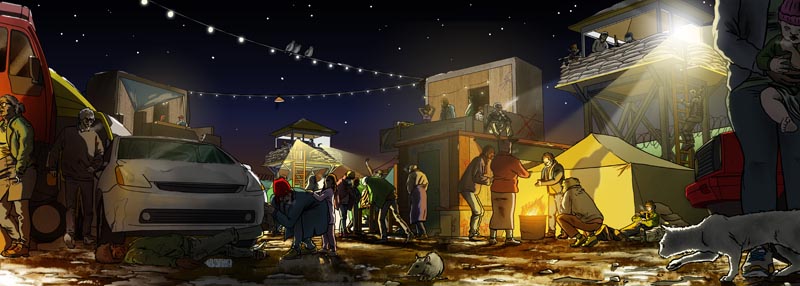Profit is the RPG mechanic debuting with Red Markets. The dice mechanic uses two 10-sided dice of different colors called Red and Black. Succeeding on a roll means landing “in the Black” using luck or resources gambled to modify the result. Failure means landing “in the Red.” In short, players need profit to succeed.
At the basic level, a new player need only be able to answer one question: is one number higher than the other? This simplicity speeds up play and keeps the game moving quickly without sacrificing its economic focus.
But groups seeking more complex play aren’t left out. Profit is a modular system with scalable difficulty and complexity. The same 2d10 roll used to determine success can generate a dizzying array of game information: mapping supply/demand curves for local goods, determining hit locations and damage, placing wandering enemies, selecting roleplaying prompts. Profit can randomly generate entire encounters, scenarios, settings, and more! Or it can be simplified down to a simple “higher or lower?” success/failure resolution mechanic. Either way, a roll of Black and Red is all you ever need.
- Ennie Nominated Best Game 2018
- Every Number Makes a Moment: All the “crunch” in Profit is story-oriented. Gear is never just stuff; it’s a grating financial burden, a psychological fetish, or a miraculous reprieve. An attack never merely hits; players know where it hit, how hard, and how to cater their roleplaying accordingly. A character’s ability to earn doesn’t just keep them living; it keeps them sane and feeds a family of dependent NPCs. Every shifting value on the character sheet alters the life it represents, each personality transforming under the demands of living in The Loss.
- Materialist Philosophy: Profit turns the “dungeon-crawling” ethos of old-school RPGs into a source of personal horror. The quality of a group’s gear determines its survival, but owing your life to a thing ain’t easy. Every piece of gear costs to purchase and to maintain. Profit’s materialist philosophy challenges players to do the most with the least because debt is as deadly as any monster.
- Complex, Strategic Social Combat: Negotiating the price of a job involves complex social combat that depends as much on nuanced roleplaying as lucky dice. Like every good business, the group that hopes to survive must strike a balance between the soft skills (like manipulating clients) and the hard skills (like decapitating zombies).
- Player-generated Setting and Content: The GM doesn’t have to do everything. Groups start campaign play by generating their own enclave, determining its location, history, economy, politics, etc. And any group can generate a Score: a method of GM-less scenario design that lets players determine a job’s elements while still allowing for plenty of surprise during play.
- Interpersonal Systems: Coworkers are not comrades. Cooperation may be required for survival, but characters don’t have to like each other along the way. Rivalry works as well at the table as friendship because the difficulty of surviving the Market demands a minimum level of synergy. Profit features rules to prompt great roleplaying from the group and expands the variety of inter-party relationships players can craft.
- Modular Design and Scalable Difficulty: Red Markets can be about killing zombies. Or Red Markets can be about complex socio-political intrigue, corporate sabotage, family drama, currency exchange schemes … and killing zombies. Players can control the biggest badasses in the Loss, or they can play a running cycle of doomed fools torn apart in a rogue-like meat grinder. The length, structure, and difficulty of each session depends on which sub-systems your group uses to construct a personalized game engine catered to taste.
- Quick and Easy Scenario Design: Need a zombie dungeon? Print out some blueprints or reference a local landmark: the ruins of the Loss are the big box stores and factories of your hometown. Need an encounter? Roll for one on the d100 table, or inspire yourself with our d10 encounter themes. Need more enemies? Let the dice generate them. The streamlined scenario design allows GMs to prepare multiple scenarios for every game, giving the group a choice of adventures based on player taste, character ethics, or highest bidder.
- Thematic Integrity: Every roll in Profit is designed to reinforce the theme of economic horror. The swingy 2d10 dice mechanic and the power of material goods to improve the chances of success make every action an exercise in weighing cost, risk, and reward.



